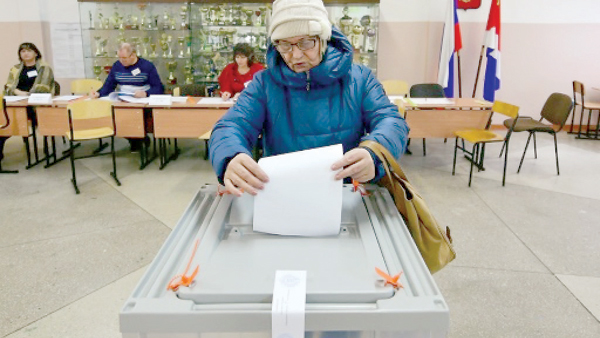

Moscow: A Kremlin-backed candidate has won a key governorship election in Russia’s Far East but critics denounced the vote as a fraud after a popular opposition figure was not allowed to run.
An electoral crisis erupted in the Far Eastern region of Primorsky Krai in September when opposition protests and claims of widespread irregularities in favour of a candidate backed by President Vladimir Putin forced officials to order a re-run of the vote.
During the new gubernatorial poll held on Sunday, acting governor Oleg Kozhemyako — backed by the Kremlin — took 61.88 per cent of the vote, final results showed.
His closest rival, Andrei Andreichenko of the nationalist LDPR party, took 25 per cent.
It was the first time in modern Russia an election was re-run after protests over vote-rigging allegations.
A popular opposition candidate, the Communist Party’s Andrei Ishchenko, who had accused a ruling party representative endorsed by Putin of “stealing” his victory in the initial election, was not allowed to stand on Sunday.
Authorities said he did not receive the required number of signatures from local lawmakers.
Primorsky Krai — which borders China and North Korea and lies on the Sea of Japan — is one of Russia’s most important regions and the Kremlin is keen to maintain firm control.
Russian voters, battling rising poverty under Western sanctions and a controversial pension reform, have punished Kremlin-backed candidates in polls in recent months.
Election officials in Primorsky Krai said they did not receive any complaints about possible vote irregularities during the Sunday vote.
But independent election observers and political analysts questioned its legitimacy given the absence of Ishchenko and claims of fraud.
Sergei Shpilkin, a physicist who studies Russian elections, estimated Kozhemyako’s “real” result at around 46 per cent, based on his own statistical analysis of the published results.
He also said that turnout was around 37 per cent, less than the official figure of 46 per cent, indicating even less interest in the election.
Grigory Melkonyants, co-chairman of Golos, an independent organisation that monitors voting, called the poll “a one-sided game”.
He said there were suspected cases of ballot stuffing and outright falsification at some polling stations and that without these violations there would have likely been a second round.
“We did not see a genuine competition among the candidates,” he said. Unlike the initial September elections, independent observers were not allowed to carefully monitor the re-run, he added.
Kremlin critics said authorities had pulled out all the stops to make sure the Moscow-backed candidate won.
“It’s a sham election. The Kremlin has falsified everything,” opposition leader Alexei Navalny wrote on his blog. “Residents of Primorsky Krai have been humiliated.”
In September, the Communist Party rejected the invalidation of the initial vote, urging the authorities to instead call the race for the 37-year-old Ishchenko.
At the time Ishchenko seemed poised to become the next governor of Primorsky Krai until the results of the vote changed overnight, allowing his Kremlin-backed rival to claim victory.
That election was a second-round run-off after the Moscow-backed candidate, Andrei Tarasenko, failed to win at least 50 per cent of the vote in a first stage.
After the crisis erupted the 56-year-old Kozhemyako, the then governor of Sakhalin region, was appointed acting chief of Primorsky Krai in late September.
His wife Irina Gerasimenko is described by the Russian edition of Forbes as one of the country’s wealthiest women, with an estimated worth of $180 million. — AFP
Oman Observer is now on the WhatsApp channel. Click here



